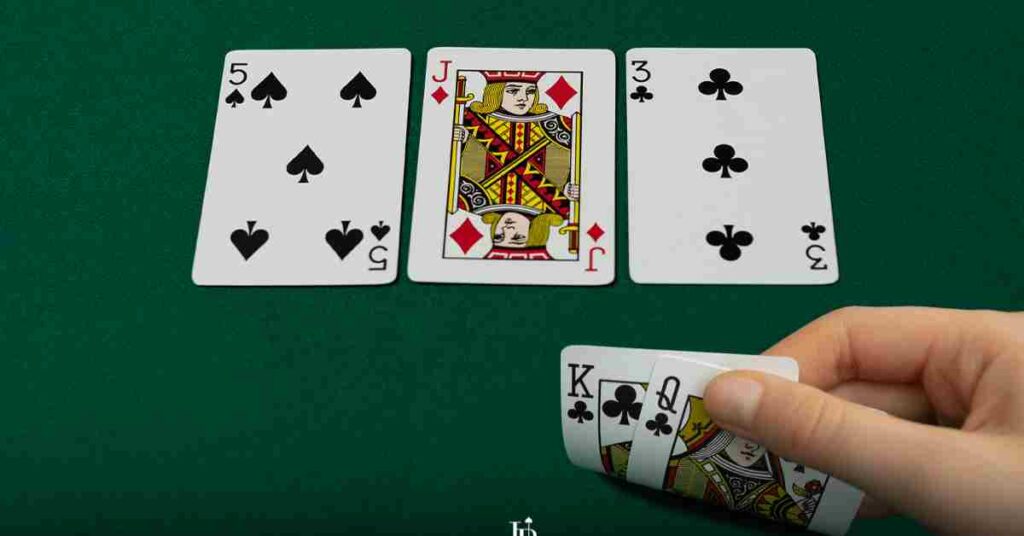Community cards in Poker serve as the common denominator that brings unpredictability into each game. These cards have the power to turn the tide of a match, elevating strategy to a level that often surpasses even the most calculated expectations.
What Are Community Cards?
Community cards serve as shared resources in certain types of poker games. Players use these cards in conjunction with their hole cards to make the best possible five-card hand. Community cards are dealt face-up at the center of the table for all to see, and players build hands using these communal resources. Games like Omaha and Texas Holdem prominently feature this concept.
Mechanics of Community Cards
The method of dealing community cards varies between different poker variations, yet the general principle remains constant. In Texas Hold’em, for example, five community cards are dealt in a specific sequence: a flop (3 cards), followed by a turn (1 card), and then a river (1 card). Players need to factor in these cards when calculating hand probabilities and deciding on actions like calling, raising, or folding.
Utilizing Community Cards in Decision-Making
Community cards can indicate your odds of winning and help you decide your next move. For example, if you have two diamonds in your hand and two more appear among the community cards, the chance of completing a flush becomes higher. Knowing when to push an advantage or when to fold based on the community cards can be instrumental in long-term poker success.
Strategies to Consider with Community Cards
Reading the Board
Understanding the potential strength of other hands based on the community cards is essential. If the community cards include three cards of the same suit, there’s a chance an opponent might have a flush. The same goes for three consecutive community cards, which might mean someone has a straight.
Slow Playing
Sometimes, it may be beneficial to hold back even if you have a strong hand. By doing so, you allow your opponents to think they have a better hand than you, leading them to bet more. This strategy can be risky but rewarding if the community cards are in your favor and you sense your opponents are unsure.
Pot Control
Community cards that don’t improve your hand could mean it’s time for pot control. Betting less or checking in this situation can be wise. Overcommitting can be detrimental when the community cards are not favorable.
Blocking and Drawing
If you’re one card away from a strong hand and a community card can complete it, you might choose to bet or raise to block your opponents from doing so. This move can also intimidate players into folding, even if they have decent hands.
Check-Raising
Check-raising is a strategy where you initially check but then raise after an opponent has bet. This tactic can be particularly effective when you’re confident that the community cards are more beneficial to your hand than to your opponents.
Semi-Bluffing
In scenarios where the community cards give you numerous outs, such as when you have four parts of a flush or an open-ended straight, semi-bluffing by placing a bet can be a useful strategy. It puts pressure on your opponents, forcing them to make decisions, but it also leaves you with the potential to improve your hand.
Board Texture Analysis
Certain community card configurations are more likely to help specific types of hands. For example, paired community cards favor those with a matching hole card, as they are then closer to making a full house.
Positional Considerations
Your position at the table can be a significant factor in how you use community cards. Being one of the last to act allows you to see how many others remain in the hand and how they’ve acted before you make your move.
Advanced Strategies
Floating the Flop
This strategy involves calling a bet on the flop with plans to steal the pot later. If the community cards on the turn are unlikely to have helped your opponent, it could be prime time to make your move.
Implied Odds
This advanced concept focuses on estimating not only the odds you currently have but also the odds that you could have in future rounds based on your read of the other players and the community cards. Mastering implied odds can give you an edge in complex situations.
Pot Odds and Expected Value
Understanding how much is in the pot and how much you need to pay to continue playing helps in calculating the expected value of a hand. Community cards play a critical role in this calculation because they help you estimate the strength of your current hand versus potential future hands.
Table Dynamics
Recognizing how other players react to community cards can offer insights into their strategies, which in turn can influence your decisions.
Related Articles:
Finding the right online casino payment method for you
Conclusion
Understanding the role of community cards in Poker can dramatically shift the way you approach each hand. A grasp of the strategies concerning these shared cards is instrumental in crafting a robust overall game plan.
